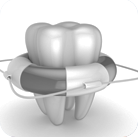Gum disease is a common problem which many people fail to treat until it is too late and they are at risk of losing a tooth.
Bleeding and inflammation are typical symptoms of the first stages of gum disease and we recommend you seek treatment as soon as possible to prevent deterioration.
Causes of gum disease
One of the main factors leading to gum disease is poor dental hygiene. Not caring for your teeth and gums adequately leads to the build up of plaque and can result in bacteria infecting your gums.
Further risk factors include:
- Smoking
- Sugary or carbohydrate-rich diets
- Crooked or overlapping teeth
- A weakened immune system
- Various medical conditions such as cancer or diabetes mellitus
- Certain medications
When plaque builds-up in the mouth it can irritate the gums which leads to bleeding and inflammation. Bacteria can then infect the gums causing the first stage of gum disease, which is known as gingivitis.
If left untreated, gingivitis may lead to the more serious condition of periodontitis. This causes gums to recede or draw back from the tooth. Pockets of infection develop in the gums and this can eventually lead to destruction of the bone that holds the teeth in place.
Gum disease treatment
Good oral hygiene such as regular brushing and flossing is the first step towards preventing gum disease. Frequent dental check-ups will also help towards the maintenance of your gum tissue.
Penwortham Dental offers gum hygiene treatments such as tooth cleaning and scaling. We also stock fluoride treatments which you can use at home. Deep cleaning carried out by the dentist or dental hygienist will also help tackle gum disease.
Occasionally, where periodontitis has advanced, we may refer you to a periodontal specialist who is an expert and highly experienced in treating severe gum disease.
Tips to prevent gum disease
At Penwortham Dental we are passionate about keeping your teeth clean and your gums healthy. Below are some helpful ways you can maintain healthy gums:
- Brushing: When you brush your teeth make small circular movements on each tooth whilst holding the brush at a 45-degree angle. Be sure to clean the inside and top surfaces of your teeth as well. Effective brushing should take approximately two minutes
- Flossing: Regular flossing is important to maintain your oral health. Move the dental floss in a back and forth motion between your teeth. Also, you should work the floss under the gum
- Interdental brushing: This type of brush is used to clean between the teeth. Using an interdental brush on a daily basis will remove debris that a regular brush cannot reach. These are available in different sizes. Please ask your dentist if you require further advice
If you have experienced bleeding or swollen gums recently or you need a dental check up, please call Penwortham Dental on 01772 742747 or click here to contact us.





 Book an Appointment
Book an Appointment
 Call Us 01772 742 747
Call Us 01772 742 747





